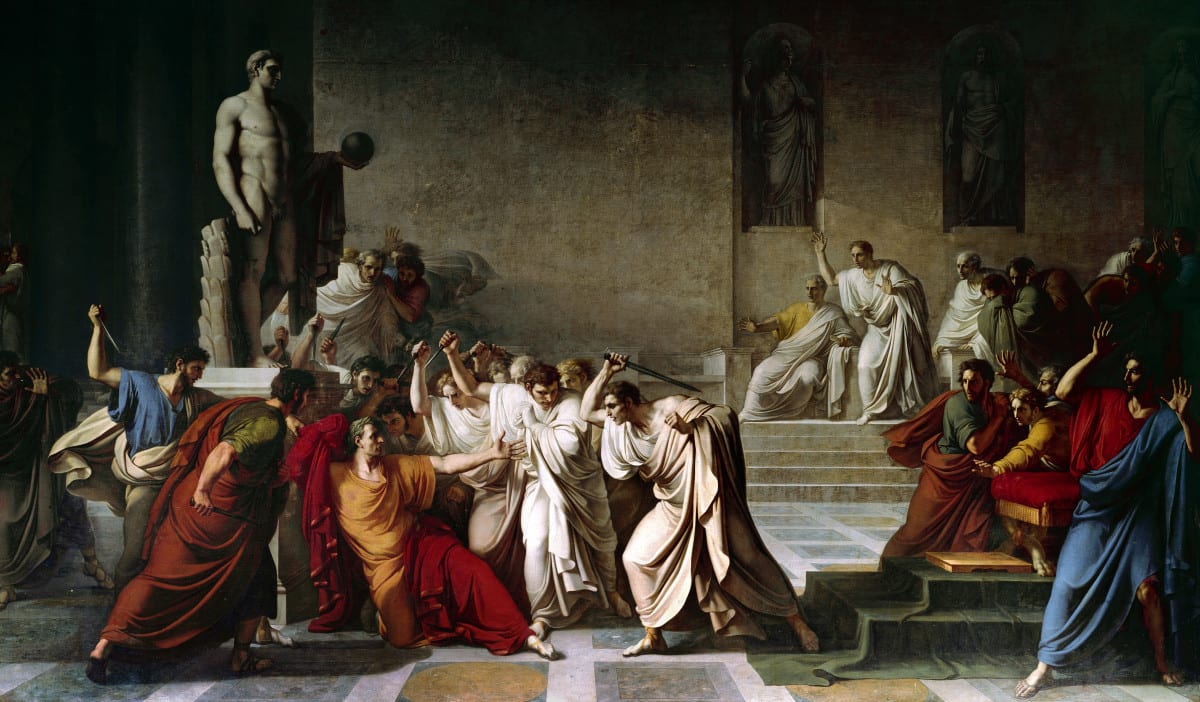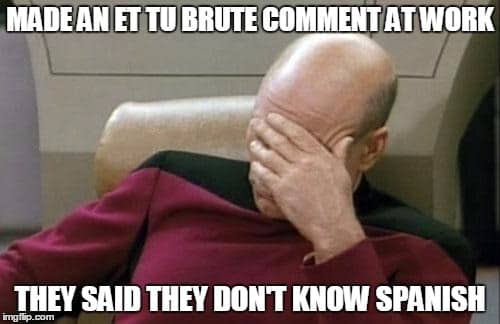Although Latin, ‘Et tu Brute‘ is one of the most famous quotations from English literature, from Shakespeare’s Julius Caesar play.
It is uttered by Julius Caesar in one of the most dramatic, violent and bloody scenes, in which a group of murderers – including Brutus – gang up on their victim, Julius Caesar, to stab him to death, then wash their hands in his blood. ‘Et tu Brute! Then fall Caesar!’ are Caesar’s last words.
‘Et tu Brute’ meaning
The translation of ‘Et tu Brute’ from Latin is ‘Even you, Brutus?’.
The story behind ‘Et tu Brute’
In the play, a group of senators – Caesar’s good friend Brutus among them – have decided that Julius Caesar’s ambitions have driven him to the point where he is about to declare himself Emperor of Rome. Rome has a proud republican tradition and the group, led by Cassius and Brutus, have decided that the only solution is to assassinate him. They lure him to the capital, where he goes against his better judgment and the pleas of his wife, who has had a dream in which she’s seen her husband murdered. The conspirators use flattery and appeal to Julius Caesar’s ego to lure him, and once he is in the building they surround him and stab him to death.
Although Brutus is one of Caesar’s closest friends Brutus has recognised the dangers in Caesar’s ambition and joined the conspiracy in a leading role. He stands, watching Caesar dying, stabbed by several senators. Julius Caesar staggers towards his friend, appealing to him, but Brutus stabs him. Unbelieving, Caesar says, ‘Et tu Brute? Then fall, Caesar.’ which means ‘You too Brutus?’ and gives up, saying, ‘Then fall Caesar.’ as he dies. They are the last words he utters.
When Shakespeare writes about real historical characters he takes his information from the writings of historians. For the Roman plays, he uses North’s translation of the Roman historian Plutarch’s biographical writings about Roman figures, and he also uses another Roman historian, Suetonius, both of whom wrote about the assassination of Julius Caesar. Plutarch has Caesar just pulling his toga over his head and dying in silence. Shakespeare prefers the more dramatic account of Suetonius who has him saying “Kai su teknon?” (‘You too, my son?’) It’s Greek, which was spoken more by high ranking Romans than the more vulgar Latin, which was the language of the common people, but Shakespeare puts it into Latin.
And so, Shakespeare uses these three words – et tu brute – for maximum theatrical effect. To ask that question of your best friend, who is in the process of murdering you, has to be one of the most moving utterances ever made. It is the trademark of Shakespeare as a writer to squeeze huge amounts of significance into just a word or three. And because it is so spectacularly loaded a phrase, it has come to mean a great deal more beyond the confines of the text. It does not just mean betrayal but the unbelievable betrayal of trust by the last person on earth that one would expect to betray one. That has to be the most hurtful thing one could experience, and anyone being asked ‘Et tu Brute?’ would know how badly he or she has hurt someone who has had complete trust in them.
Watch the stabbing of Julius Caesar – complete with the classic line ‘Et tu Brute’ from the HBO series ‘Rome’:
‘Et tu Brute’ memes
Julius Caesar’s stabbing by the whole Roman Senate whilst proclaiming ‘Et tu, Brute’ is a pretty grisly topic… so here are a few of our favourite ‘Et tu Brute’ memes to help cheer you up!
See more Shakespeare memes.

Julius Caesar is set upon by senators on the ides of March, prompting the famous line ‘Et tu Brute’







Gloria en Excelsis Dio!